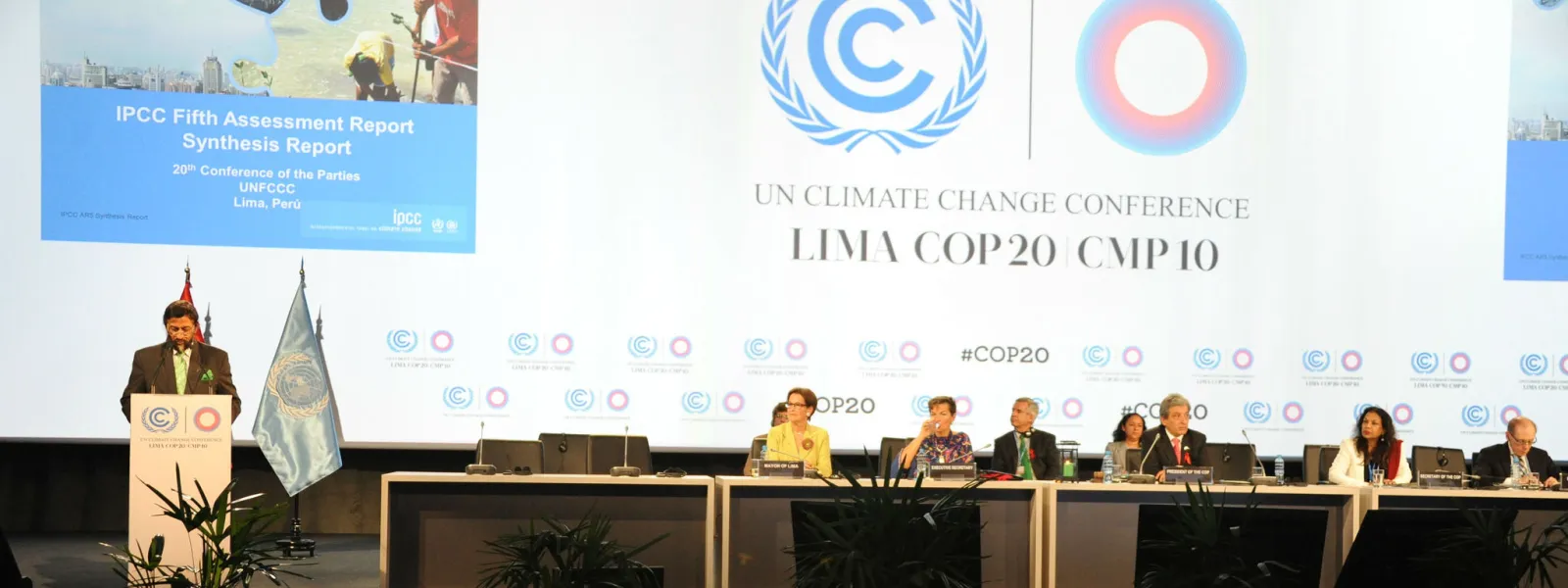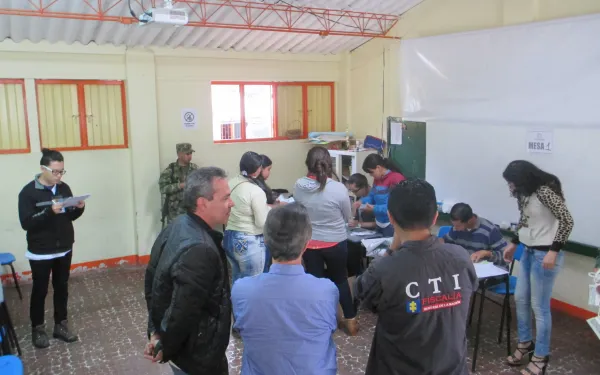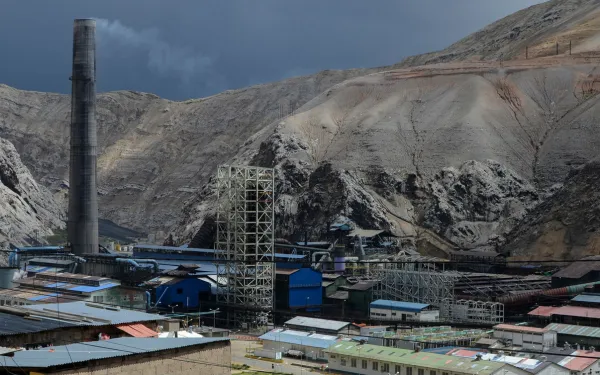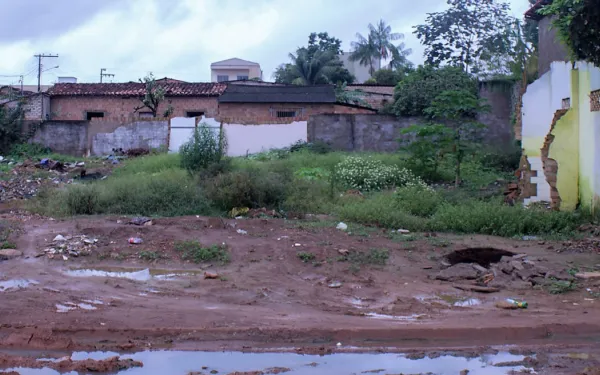
Project
Photo: UNFCCCMonitoring the UN Climate Negotiations
As changes in climate become more extreme, their affects are being hardest felt throughout developing countries. Since 1994, the United Nations Framework Convention on Climate Change has laid out actions to limit the increase of global average temperatures and confront the impacts of climate change.
The States that are Parties to the Convention meet every year in the so-called Conference of the Parties (COP) to review their commitments, the progress made in fulfilling them, and pending challenges in the global fight against the climate crisis.
At COP21 in 2015, they adopted the Paris Agreement, which seeks to strengthen the global response to the climate emergency, establishing a common framework for all countries to work on the basis of their capacities and through the presentation of Nationally Determined Contributions (NDC) that will:
- Limit the increase in global temperatures to 2°C compared to pre-industrial levels and continue efforts to limit it to 1.5°C;
- Increase the capacity of countries to adapt to the impacts of climate change; and
- Ensure that financing responds to the goal of reducing greenhouse gas emissions.
Our focus areas
THE CLIMATE CRISIS AND HUMAN RIGHTS
The climate crisis, due to its transversal character, has repercussions in various fields, geographies, contexts and people. In this regard, the Preamble to the Paris Agreement states that it is the obligation of States to "respect, promote and fulfill their respective obligations on human rights, the right to health, the rights of indigenous peoples, local communities, migrants, children, persons with disabilities and people in vulnerable situations and the right to development, as well as gender equality, the empowerment of women and intergenerational equity."
AIDA at the COP
COP25: Chile-Madrid 2019
At COP25 in Madrid, Spain, we advocated for the inclusion of the human rights perspective in various agenda items. We promoted the incorporation of broad socio-environmental safeguards in the regulation of Article 6 of the Paris Agreement, which refers to carbon markets. We closely followed the adoption of the Gender Action Plan, as well as the Santiago Network, created "to catalyze technical assistance […] in developing countries that are particularly vulnerable to the adverse affects of climate change." We also encouraged the inclusion of ambitious and measurable targets for the reduction of short-lived climate pollutants in the climate commitments of States.
Related projects

Victory in Colombia: Citizens Vote to Ban Mining in their Territory
On March 26, 2017, 98% of voters in Cajamarca, Colombia decisively rejected mining in their territory. The results of the referendum (or “popular consultation”) are binding under Colombian law. Now municipal authorities must issue regulations to implement the ban. AIDA was part of the legal team that advised the Cajamarca community and developed a strategy, including the referendum, to stop a proposed mine that threatens to pollute the water supply. AngloGold Ashanti was in the exploration phase of a project called La Colosa (the Collosus)—aptly named, because it would be among the world’s 10 largest open-pit gold mines, the second-largest in Latin America. In a country coming out of a 50-year civil war, the referendum is a victory not only for the environment, but also for democracy. Banning mining through popular consultation demonstrates a commitment to solving environmental conflicts in a peaceful and participatory manner. It also allows citizens to exercise their human right to have a voice in public issues that affect them—a key element of true democracy—and to safeguard their human right to a healthy environment.
Read more
Lowering Peru’s air quality standards is regressive and harmful to public health
The government of Peru has proposed increasing the legal amount of sulfur dioxide in the air by more than 12 times and doubling the allowed level of particulate matter, substances known to cause serious health harms. The proposal ignores both scientific evidence and the government’s obligation to uphold conditions that are suitable for human life and health. Lima, Peru. Peru’s Environment Ministry has proposed new National Environmental Quality Standards for air, which would impact the health of Peruvians everywhere. The proposed standard increases by more than 12 times the limit for airborne concentrations of sulfur dioxide (SO2) and doubles the allowable amount of fine particulate matter. The increased limits ignore scientific evidence that finds these substances can cause lung problems and other illnesses, particularly among the most vulnerable populations such as people with asthma, children, and the elderly. “There is overwhelming scientific evidence to conclude that sulfur dioxide pollution poses a serious health risk, particularly when the contamination reaches high levels over short periods of time, something the proposal does not take into account,” said Anna Cederstav, co-director of the Interamerican Association for Environmental Defense (AIDA). AIDA prepared comments on the proposal that were presented to the government of Peru together with APRODEH. These pointed out that, contrary to the government’s assertion, reducing sulfur dioxide levels in the air would lead to longer life expectancy. This is because, among other reasons, sulfur dioxide also promotes the formation of PM2.5, small particulate matter that lodges in human lungs and causes acute respiratory problems such as bronchitis and pneumonia, as well as premature death. The government proposes to simultaneously double the legal limit for these extremely harmful particles. The organizations also highlighted flaws in the public consultation process. The government published the draft standard on Saturday, April 8, just before the Easter week holiday, giving only 10 working days for public comment on this critical public health issue. They also failed to make public the entire scientific and technical basis for the proposal. In so doing, the government has violated the rights to information and public participation. The comments also emphasize that the government’s proposal violates the American Convention on Human Rights and other international treaties to which Peru is a party, by failing to guarantee the human rights to life and health. While the proposed changes would impact Peru’s entire population, the residents of cities with high levels of pollution, such as La Oroya, would suffer the most severe impacts. La Oroya is an emblematic case because the metallurgical complex operating there—which has for decades been a macro-emitter of pollutants—is in the process of being sold. The government has publically acknowledged that the weakening of the air quality standards is an attempt to promote the sale of the complex. But it ignores the effects those relaxed standards would have on the people of La Oroya, who have seen significant improvements to both their air quality and their health in recent years. People affected by the pollution in La Oroya have sued the State before the Inter-American Commission on Human Rights in an attempt to protect their rights. For ten years, they have been granted precautionary measures due to the risk the pollution poses to their health and life; those measures were recently extended to additional people because the level of risk has continued. “Relaxing air quality standards to facilitate the sale of the complex and increase investment in Peru would be a setback for the protection of health and the environment, which could result in the State being held responsible before the Inter-American Court on Human Rights,” said Christian Huaylinos of APRODEH. “In addition, such actions would violate free trade agreements signed by Peru with the United States and the European Union.” Consult the comments sent to the Environment Ministry of Peru and more information on the case of La Oroya. Press contacts: Rodrigo da Costa Sales, AIDA, [email protected], +51 994767961 Christian Huaylinos, APRODEH, [email protected], +51 959 789 232
Read more
Belo Monte Dam must comply with conditions before continuing operations
Last week a federal court in Brazil suspended the operating license of the Belo Monte Dam. Prosecutors said the dam's operating company, Norte Energía, failed to complete basic sanitation works in the city of Altamira, which has been directly affected by the hydroelectric project. The decision comes in response to a legal appeal filed by the Federal Public Ministry. The sanitation work was a condition for the dam's licensing, authorized by the Brazilian Institute of Environmental Resources (IBAMA), and should have been completed before the reservoir was filled; it was not. "This is the first time that a federal court has suspended one of Belo Monte's suspensão de segurança, a legal tool that guarantees the dam's operation even though it hasn't completed the conditions required under its operating license. In practice, the decision means that the dam must immediately halt all operations, although the completion of pending work may continue," explained AIDA attorney Marcella Ribeiro. "Beyond being an issue of sanitation, this judgment represents an important step forward in the fight to force the operating company to adequately comply with the conditions necessary for the dam's operation, which favor affected communities." "We hope the Brazilian justice system continues to guarantee the protection of the rights of all those affected by the Belo Monte Dam.”
Read more